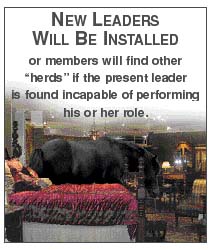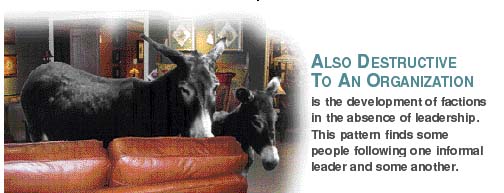A kind of herd mentality exists on the sales floors of furniture stores. If leadership falters, then the herd will pick another “alpha’ animal.

This weekend my wife and I attended the largest equestrian event in America dedicated to education and better performance for riders and horse owners. The best trainers and horse experts in the country held clinics, gave demonstrations, and made themselves available to everyone for one-to-one questions. This reminded me of the 12th floor NHFA center in the main building at High Point with one notable exception: The equestrian events were far more highly attended.
There was one particularly significant presentation on horse behavior and training that sent my mind reeling. Its impact on what I do for a living, and my beliefs about human performance and group dynamics were profound. The presenter was a unique young man named Gawani Pony Boy, who is something of a phenomenon in the equestrian world because of his unbelievably cogent insights into animal, and human behavior. Two things he said have applications in running furniture sales teams and dealing with individual performance. Certainly people can’t be compared to horses, but there are common principles of natural behavior in social groups, that can be applied to human endeavors.
Horses are herd animals, and, in the wild, it’s the herd that matters most. Individual horses must keep in mind two major factors that impact their security and well-being:
- What is my place in the herd (the proverbial pecking order.
- Is the leader living up to his or her position? This factor is most important.
Managing Expectations
The individual animal needs to know exactly what is expected of him or her to be content. How does this apply to us? In store situations where there are demands for high performance, but where there are unclear expectations, and no well thought out job descriptions, a lot of uncertainty exists. People don’t know what is expected of them, so their performance often falls short of the owner’s or manager’s expectations. The result is that they often feel anger towards their salespeople. “Why can’t they think like me?” is always the underlying, unsaid question they ask. Inside they usually know the answer, which is that, “they don’t think like me because they’re not me.” If they were… conflict would ensue, because assertive, entrepreneurial people don’t fit well into lower places in the “pecking order”.
In situations where one or more top performers produce an inordinate amount of business, things are even worse. Favoritism is usually the dominant mood. Owners show that they value only those who generate high volume. Turnover is usually excessive in these companies, because people crave fairness, security and amity in their work, not favoritism, uncertainty and enmity. When turnover is high, owners get more attached to those who do perform, and the situation deteriorates even further. Normally in these companies there are, as well, poorly defined roles, no job descriptions, no written expectations – so, the “herd” falls apart. Organizations like this are in constant turmoil, and perform far below their potential. Members of these kinds of herds usually find their way to other herds, where they can “join up” and be secure, safe and happy.
The leaders of these organizations inevitably blame the employees for being, well… employees. They believe that their employees should act and think like owners. However, if they did, they’d be owners. Employees in these types of companies often feel devalued by their managers. The result is that these organizations have no commitment to individual development. Furthermore, they don’t invest in finding good people and bringing them along to ever improving levels of performance in their corporate culture. These owners are usually not the kind of people who would coach little league baseball, or Pop Warner football.
Leadership
The second important lesson learned from the seminar was this: Members of the herd will continually test the leader to determine if he or she is capable of performing his or her role. If found lacking in those qualities of leadership that are important to the herd, new leaders will be installed, or members will find other herds.
In herds of horses, there are two leaders. First there’s usually a stallion surrounded by several mares – his harem. This situation makes intuitive sense in terms of Darwinian theory. That is, the fittest and most capable male ensures the survival of his offspring by mating with the maximum number and most attractive females. In addition to the lead stallion, is also an “Alpha” mare who really runs the show. The stallion has duties aside from breeding. He’s the first line of warning and defense in the case of threat to the herd – usually by predators.
This herd structure is analogous to the organizational structure in furniture stores. There is an owner (male or female) and a sales manager (or store manager). People need leadership, and there is the danger that if they find this leadership in your store to be lacking, they’ll identify their own leaders and follow them. If the leader happens to be one of them (often the top performer), the manager’s role is rendered useless, or unnecessary, and she or he loses influence and control. If the “appointed” leader is doing things his or her way, then these behaviors will become the ones that are valued by front line employees. This will occur even if the business or sales approach being followed fails to reflect the policies, values and attitudes of the owner.
Several dangerous situations can follow in the absence of leadership.
If the appointed “leader” possesses unique selling skills (as many top performers do) that are not possessed by other members of the sales team, then the performance of team members will not approach that of the top performer. A top performer happy with his role, will have no stake (monetary or otherwise) in improving anyone else’s performance. Doing so would only provide a springboard to challenge his position. In these types of organization, effective systems for elevating the skills of low performers, and improving bottom line performance are often absent.
Another dangerous case occurs when the informal leader is a low performer – or a mediocre one. This might be a smart or savvy, but lazy person whom everyone likes. When these work ethics and habits become the ones people emulate, the whole organization can be propelled into a tail-spin.

Also destructive to an organization is the development of factions in the absence of leadership. This pattern finds some people following one informal leader and some another. This usually causes good, productive people to simply drop out and find another “herd”. Those who thrive on the conflict or, what some uninformed managers might call “competitive” aspects of the job are left in place to be witnesses to the conflict.
Owners and managers can avoid these worst case scenarios by effectively dealing with group dynamics that are in play all the time. Here are some key leadership issues to look at:
Watch Out For The Herd: Watching out for the herd is a critical leadership role. If everyone in the store is in the “customer” business, then who is looking out for the needs of employees? Someone should be there to help them learn and work in a way that will help them achieve their goals a high percentage of the time?
Don’t Allow Conflict: Disruptive members of a herd need to be put down, castigated or exiled. Do personal conflicts go un-resolved? Leaving it up to “them” to settle difficult and emotional situations among themselves never works. It never gets settled. Leaders don’t allow conflict to poison their organizations and depress performance. They take an active role in resolving conflict – not hiding it.
Hold Everyone To The Same Standards: Are “favorite” people exempt from some rules? Are expectations different for some people? Can your people count on consistency in your reactions to issues? Do the rules change daily? Leaders know that everyone should be held to the same standards, but managed differently, based on their individual abilities, needs and personalities. This is purely a human issue.
Criticize Actions, Not People: Do you confuse the criticism of actions with the criticism of people? If so, you’re headed down a bad road, and you’ll experience a lot of self-imposed disappointment. Good leaders know that it’s critical to separate personal criticism from performance appraisals, and they know how to
do it.
How you address these issues will determine whether or not your people feel secure in their position and trust you to lead.
Your actions working for general good, as well as in support of individuals sets you apart as a leader. Good leaders establish direction, communicate vision, act consistently and fairly. It doesn’t matter if you are the lead stallion in your organization or the alpha mare. Just make sure that someone in management is responsible for the wellbeing of the “herd”. Only then will people know what to expect, will feel well taken care of and secure in their positions. Only then will they graze happily and profitably.